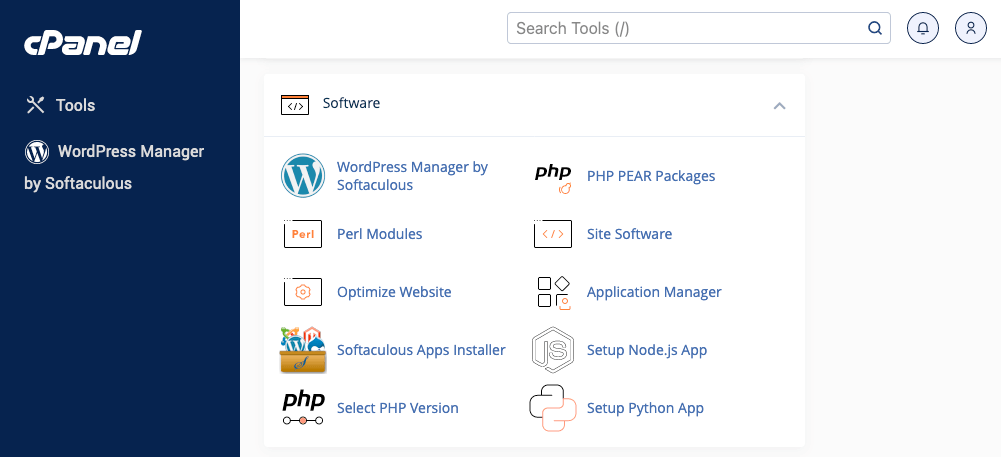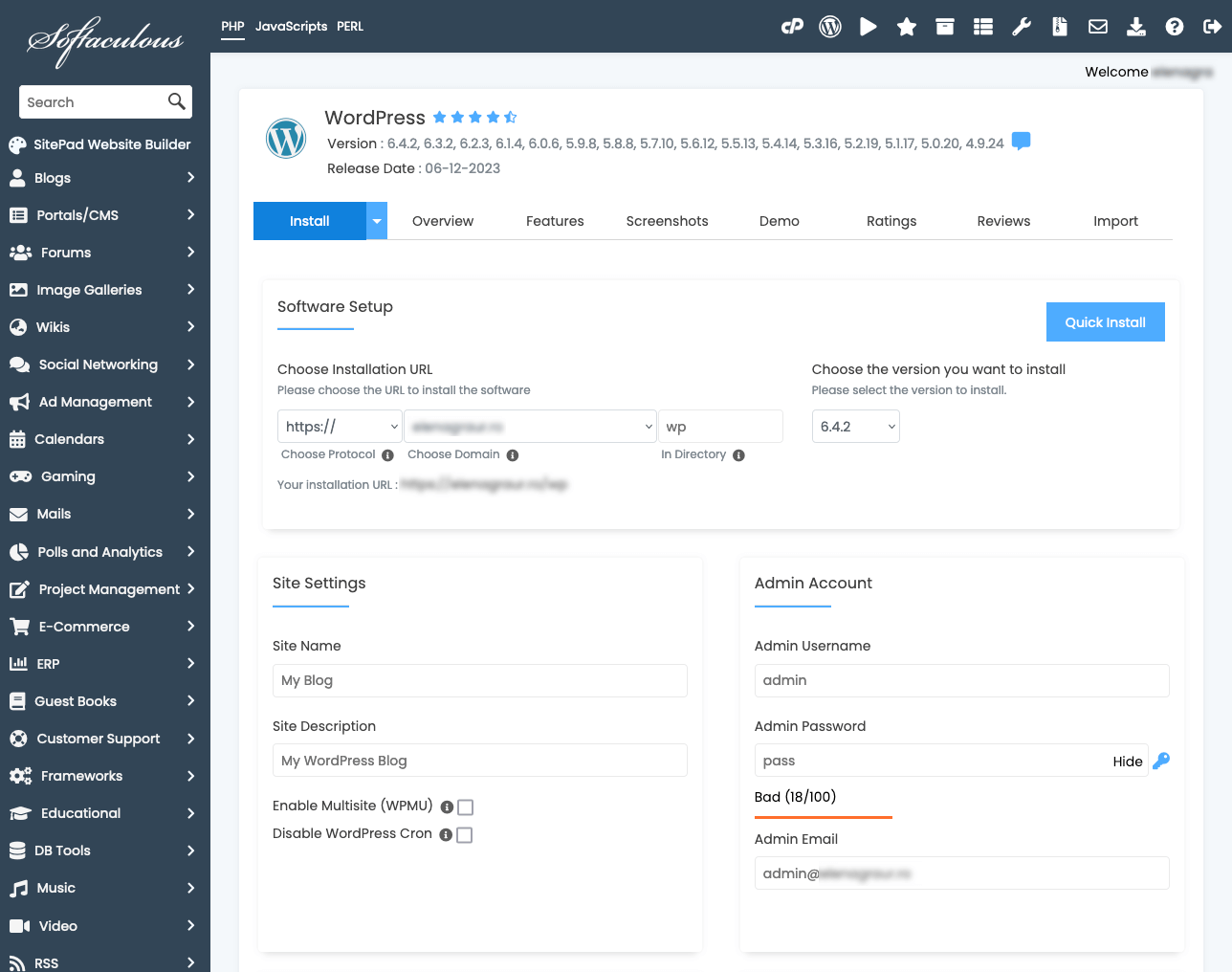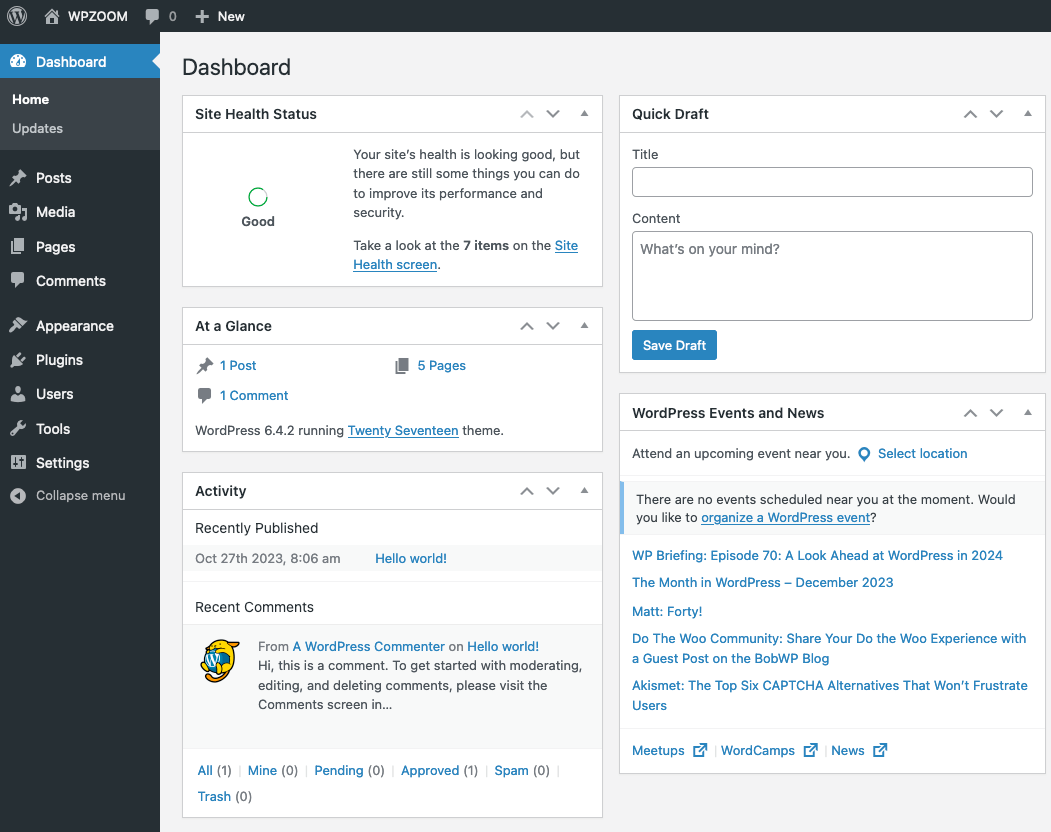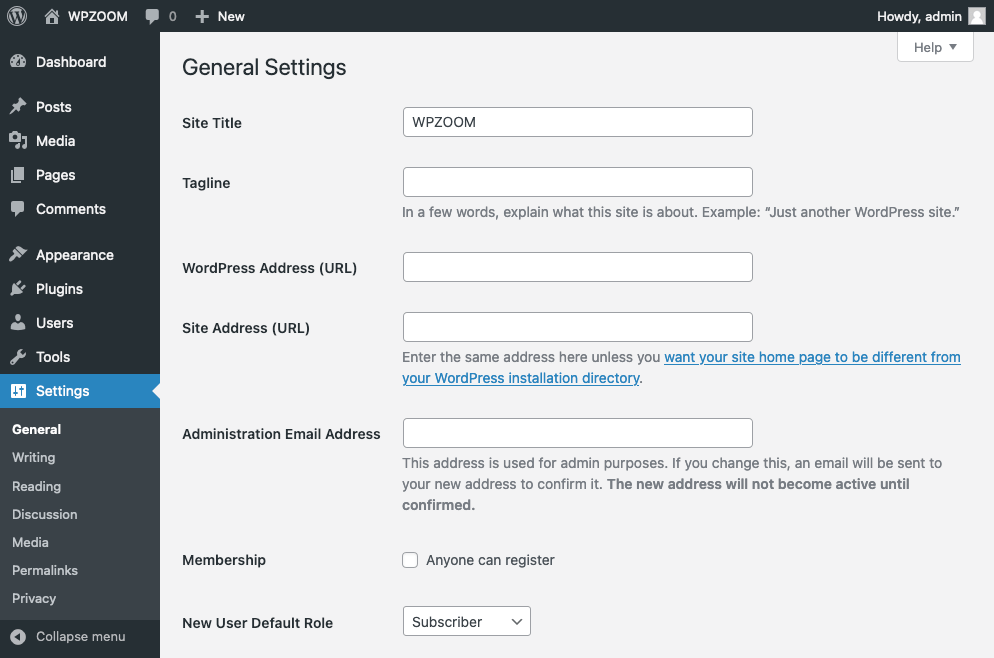Starting a book blog is an exciting venture for anyone who is passionate about literature and eager to share their insights on various reads, from the latest bestsellers to hidden gems awaiting discovery.
A book blog is an ideal platform for literature enthusiasts to express their thoughts on different genres, offer recommendations, write book reviews, improve writing skills, and foster a book blogging community with similar reading interests.
However, transforming a blog into a thriving online community requires more than posting reviews. It’s a journey filled with patience, creativity, and strategic thinking. Achieving success in the book blogging arena takes time and is always challenging.
Here’s a step-by-step guide on how to start a book blog that reflects your literary tastes and connects you with readers keen on following your literary adventures.
Quick Guide to Starting a Book Blog
Here’s a quick summary of the critical steps involved in creating a book blog:
Now, explore each aspect in more detail to ensure you’re well-equipped to make your book blog successful.
10 Steps to Start a Book Blog: A Detailed Guide
The steps to create a Book blog are relatively straightforward. Still, some parts are slightly unintuitive, and this guide will make the whole process much more manageable.
1. Identify Your Book Blog Niche
One of the initial and most strategic steps is pinpointing the precise focus of your blog. Selecting a niche in a landscape filled with content creators can significantly enhance your chances of connecting with a like-minded audience.
Consider the difference between launching a general book blog versus one centered on a specific or less saturated niche, such as rare book collecting or focusing on a particular genre like speculative fiction. Opting for a focused niche often leads to a more dedicated readership and a more precise direction for content creation.
Here are some tips for identifying the right niche for book blogs:
- Pursue Your Passion: Your blog should reflect what genuinely excites you, whether literary fiction, non-fiction, mysteries, or another aspect of the book world. Your enthusiasm for your chosen subject will resonate with your readers and encourage them to return.
- Spot Market Opportunities: Look for book-related topics that generate curiosity but must be more extensively covered. This could range from eco-literature to books on digital minimalism. Positioning your blog in a unique space can distinguish it from others.
- Know Your Target Audience: Consider who you’d like to attract to your blog. Are they searching for in-depth book reviews, or are they more interested in author interviews and literary events? Crafting your content to align with your audience’s needs and interests can make your blog more compelling and relevant.
Starting a successful book blog isn’t merely about selecting a niche but finding a space where your voice and passions can genuinely resonate. Focusing on what makes your blog distinctive lays the groundwork for a fulfilling journey into book blogging.
2. Choose a Name and Secure Your Domain
Selecting an appropriate name for your blog is a step that defines your presence in the online book community. Your blog’s name should be catchy, easy to remember, and reflect the essence of your literary focus. Here are a few tips for brainstorming the ideal blog name.
- Opt for a concise, relevant name. A shorter name sticks in the memory and helps establish a strong brand presence.
- Ensure it’s simple to spell. Your blog’s name, which also serves as your domain, should be straightforward to spell, promoting easier recall and connection to your book theme.
- Stay away from complex terminology. While it might be tempting to include literary jargon, consider your audience’s varied familiarity levels. Your goal should be accessibility.
- Aim for distinctiveness. A unique name can significantly attract more attention to your blog.
After deciding on the perfect name for your blog, the next step is to register your domain. In today’s market, domain registration is a swift process, thanks to numerous available tools and platforms.
Many book bloggers prefer using Namecheap for its cost-effectiveness and user-friendly interface.
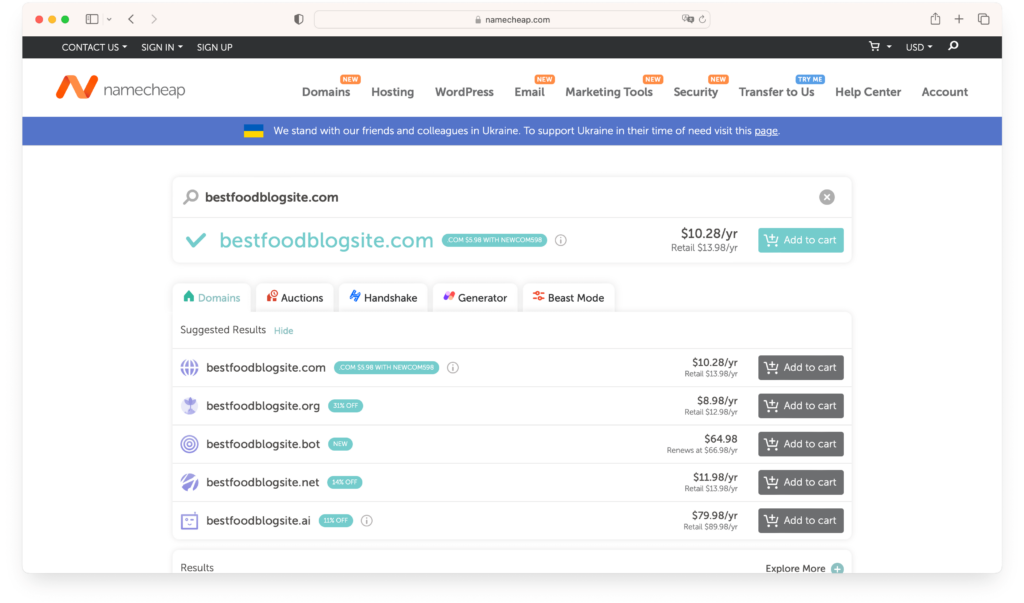
Namecheap offers a broad range of domain options, facilitating searching for one that perfectly matches your blog’s name.
3. Select a Hosting Provider
Selecting an appropriate web hosting service is crucial in starting a book blog. This choice directly influences your site’s performance, which plays a vital role in the success of your WordPress blog. Starting with a dependable hosting service can help you avoid numerous potential setbacks.
The market is filled with web hosting services, but evaluating specific criteria is imperative before deciding. Look for a hosting provider known for its reliability, solid performance, and uptime history. Technical glitches will happen, and when they do, having a hosting provider that offers prompt and efficient support is invaluable.
WordPress is often recommended for its user-friendly interface and adaptability, making it an ideal platform for creating a book blog. Therefore, choosing a hosting provider that offers effortless WordPress integration and specializes in WordPress websites can significantly streamline the setup process.
Among the myriad of choices, Siteground emerges as a strong contender. It meets all these standards, providing high-quality service at an affordable price.
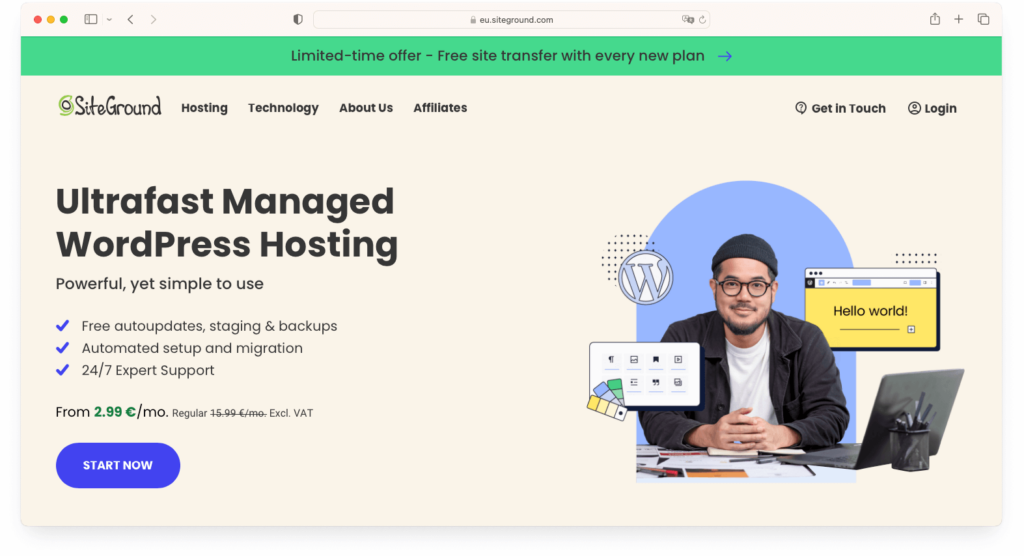
Choosing Siteground as your hosting provider sets a solid foundation for your blog, aiding in the growth and expansion of your online presence.
4. Install WordPress
After you’ve chosen your domain and secured hosting, the next step is to get your book blogging platform up and running. WordPress is ideal for many book bloggers due to its user-friendly nature and adaptability.
Here’s a straightforward guide to setting up WordPress for your blog:
- Log Into Your Hosting Control Panel: Typically, this involves using cPanel, Plesk, or a custom dashboard your hosting service provides.
- Find the WordPress Installer: Look for a one-click WordPress installation option in your hosting dashboard’s ‘Website’ or ‘Software and Services’ sections. Tools like Softaculous, Fantastico, or QuickInstall make this process much more manageable.


- Initiate the Installation Process: Follow the guided setup after selecting the WordPress installer. Here, you’ll choose the domain where you wish your blog to reside.


- Input Your Site Details: During the setup, you’ll enter crucial information about your blog, including its title, an admin username, password, and an admin email address. These details are critical for site management and security.
- Consider Advanced Options (Optional): You may encounter options to customize database names or table prefixes. For most beginners, stick with the default settings to keep things straightforward.
- Access Your WordPress Dashboard: With the installation complete, log in using your admin credentials. This dashboard is where you’ll write blog posts, modify your blog’s design, and more. Spend time to familiarize yourself with its features and layout to make your blogging process more efficient.


If you encounter any issues during the setup, don’t hesitate to contact your hosting provider’s support team for assistance with WordPress.
Setting up WordPress marks just the beginning of your journey. As you become more familiar with this platform, sharing your book reviews, insights, and recommendations will become more natural, allowing you to connect with your readers meaningfully.
5. Select a Book WordPress Theme
Picking the perfect WordPress theme is vital in setting up your blog. The theme you choose affects your blog’s appearance, performance, and ease of use.
Your time is better spent writing reviews, discussing literature, or sharing reading tips rather than getting stuck in technical details. For this reason, consider the Indigo theme for your blog. Indigo provides comprehensive features and customization options, offering everything you need for a standout book blog.

If Indigo doesn’t quite match your vision or if you’re after a unique style, other WordPress themes, such as Dérive, Inspiro PRO, and Inspiro Premium, also offer great possibilities.
Choosing your theme carefully ensures your blog is welcoming and runs smoothly, offering an enjoyable and accessible experience for your audience.
The role of a theme in building a book blog goes beyond just looks; it’s key to how effectively you can share and engage with your audience. A well-selected theme aids in your SEO efforts, helping your blog appear higher in search results and attracting new readers. It also improves the overall user experience by making it easy for visitors to navigate your WordPress site and keep them engaged longer.
6. Customize Blog Settings
Here’s how to make your book blog not only a platform for sharing reviews but a destination for fellow book enthusiasts:
- Personalize Your Blog’s Title and Tagline: Head to the Settings section in your WordPress dashboard. This is your opportunity to give your blog a title and tagline that genuinely reflects your passion for books. Adjusting your time zone here also means your book blog posts go live at just the right moment, offering consistency to your readers.


- Design a User-friendly Navigation Menu: A straightforward menu is crucial for a book blog. It should guide visitors effortlessly to your reviews, literary discussions, or book recommendations. You can customize your navigation menu under Appearance > Menus, making it easy for readers to find what interests them.
- Choose Your Homepage Layout: Decide whether you want your homepage to display your latest posts or a static page that captures the spirit of your blog. You can set this preference in Settings > Reading, ensuring your homepage reflects the identity of your book blog.
- Manage Comments with Care: Adjust your comment settings under Settings > Discussion. Deciding how to handle comments allows you to foster a community of respectful and engaging discussion, keeping the focus on the love of books.
- Optimize Your URL Structure: The structure of your URLs (permalinks) might seem like a small detail, but it significantly impacts how easily readers and search engines can navigate your blog. Customizing your URL structure in Settings > Permalinks makes your links more intuitive and search engine friendly, which helps you share your literary insights more effectively.
By taking these steps, you can create a book blog that showcases your voice in the vast world of literature and becomes a welcoming space for readers to share their thoughts and discoveries.
7. Install Essential Plugins
To infuse life and individuality into your book blog, integrating WordPress plugins is like expanding your toolkit – they enhance your blog’s functionality, fostering a more immersive and engaging experience for your visitors.
With a wide selection of plugins available, it’s vital to pinpoint those that genuinely enhance your book blog without degrading its performance. Consider the functionalities you wish to introduce. Whether your goal is SEO optimization, social media integration, boosting security, or incorporating e-commerce features, there’s likely a plugin available that meets your needs, each with its unique settings and customization options.
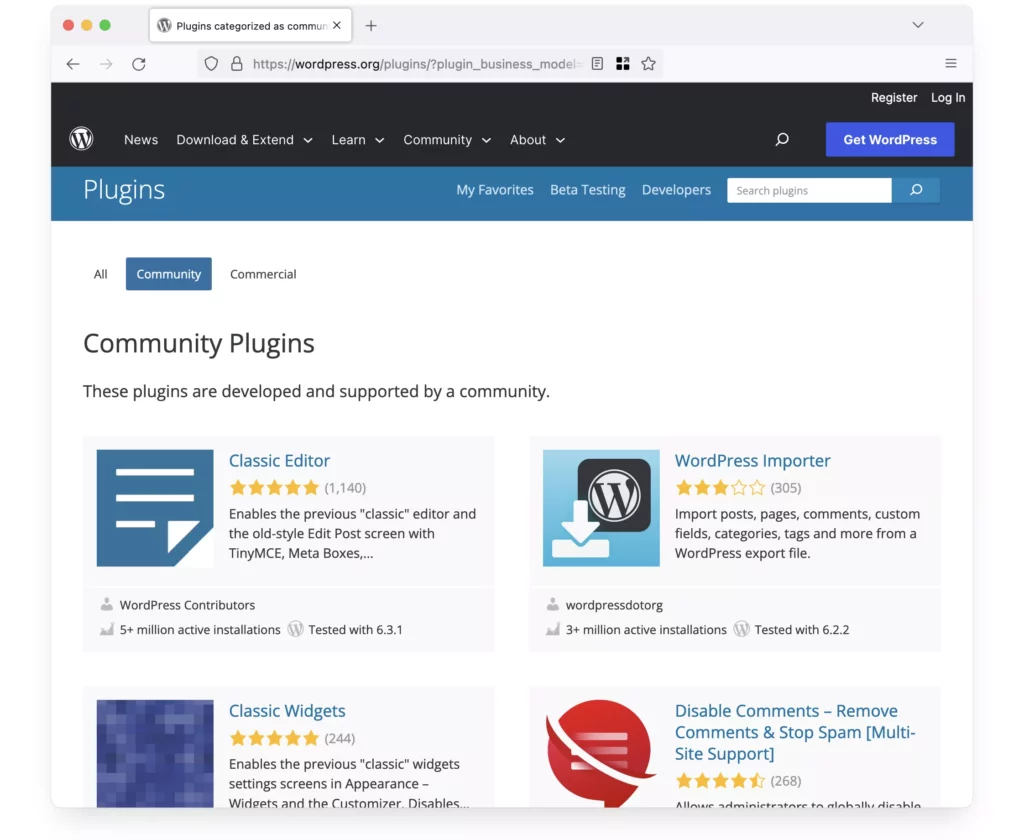

We’ve curated a list of recommended plugins across different categories to ensure you have access to quality selections.
Keeping your plugins current is vital to safeguarding your blog’s security and ensuring smooth operation. Neglecting updates can expose your blog to security vulnerabilities and compatibility issues with new updates from your blogging platform.
While plugins can significantly expand your blog’s capabilities, overloading your site with too many can impede your site’s loading speed. It’s wise to be selective, prioritizing plugins that benefit your book blog.
8. Plan and Create Captivating Posts
Crafting your content thoughtfully is crucial to achieving success with your own book blog. While it might be tempting to fill your site with posts rapidly, a more deliberate planning approach will be beneficial in the long run.
From the beginning, decide how much time you can dedicate to your blog. This decision will shape your content calendar and determine your posting frequency. Strive for consistency, whether that means updating daily, weekly, or bi-weekly.
As a book blogger, offering diverse content is vital. You might have a strong interest in a specific book genre, such as mystery, romance, or science fiction, but limiting yourself to one genre could restrict your audience size. To keep your blog engaging and welcoming, incorporate a variety of posts, from book reviews and reading tips to author interviews, personal reading journeys, upcoming book releases, and highlights of your recent reads.
Your blog serves not only book lovers and fellow bloggers but also search engines that analyze your content to decide its ranking for specific keywords. Adhering to Search Engine Optimization (SEO) best practices significantly affects your blog’s visibility and the traffic it receives. This means creating content that entices your readers and aligns with search engine guidelines to achieve a good position in search results.
Maintaining a consistent posting schedule is beneficial for building a dedicated readership. When readers know when to expect new content, they are more likely to return regularly. Offering a wide range of content can appeal to a broader audience, thus expanding your blog’s reach. Improved search engine rankings make your blog more accessible to new readers seeking content within your niche.
9. Promote and Expand Your Book Blog
Social media is a vital ally in broadening the reach of your book blog and drawing in a wider audience. The strategies you employ for promotion can significantly influence your blog’s visibility, emphasizing the importance of social media in your promotional toolkit.
Diving into video content opens up opportunities on platforms like YouTube, TikTok, Facebook Reels, and Snapchat, which can attract a diverse audience. If writing is more your style, engaging in community discussions on Reddit or sharing insights on Quora can effectively spread the word about your blog.
Instagram, Facebook, and Pinterest are ideal for book bloggers who want to showcase their literary journey. These platforms offer numerous possibilities for those ready to invest time and effort into promotion.
Creating a dedicated community around your book blog is crucial. Encourage visitors to subscribe to your newsletter or create a Facebook group for your readers. Regularly contacting and engaging with your social media followers fosters a strong sense of community and loyalty.
Understanding how each platform can best complement your content is key when promoting a book blog. Video platforms are excellent for sharing reviews, unboxings, or personal reading experiences, while written platforms can provide detailed book analyses and recommendations. Photo-sharing platforms allow you to visually share your reading nook, book hauls, and literary adventures with a broader audience.
10. Make Money With Your Book Blog
Transforming your book blog into a revenue-generating platform becomes viable once you’ve attracted a dedicated readership and fostered a sense of community. While covering every monetization strategy in one piece is challenging, here are several practical approaches to help your book blog yield financial rewards.
- Display Ads: Implementing display ads through services like Google AdSense is a straightforward initial step toward earning income. As your successful blog blog garners more readers, ad revenue should steadily increase.
- Affiliate Marketing: This method can be particularly profitable if you align your efforts with your audience’s preferences. Recommending books, reading accessories, and literary subscriptions you trust and use can generate substantial earnings, especially when your suggestions resonate with your readers.
- Sponsored Content: Establishing partnerships for sponsored posts can evolve into a reliable income source. This involves collaborating with publishers, authors, or literary brands that share an affinity with your blog’s theme and your audience’s tastes, thereby monetizing your content in a manner that adds value for your readers.
- Digital Products: Creating and offering digital products like exclusive book reviews, reading guides, or literary analysis courses can significantly boost your revenue. Designing these offerings to meet your audience’s interests and needs can make them especially attractive.
While various methods exist to monetize a book blog, these strategies represent some of the most accessible and frequently applied. Promoting products or services you genuinely believe in is key. For instance, if a particular book or reading accessory has become essential in your literary journey, sharing your thoughts and experiences can effectively generate income. However, it’s advisable to recommend only those products with which you have personal experience.
Bottom Line
Starting a book review blog may initially appear challenging, but grasping the advice provided here will equip you to navigate the phases of your blogging journey confidently.
Creating a book blog is a process that unfolds over time. It’s perfectly fine to progress at your own pace. With a systematic and reflective approach, the pieces will start to fit together, and you’ll witness the growth of your efforts.
Here’s an overview of the crucial steps to become a book blogger:
- Identify your book niche. This focus could vary from literary fiction and non-fiction to genres like science fiction or romance, tailored to your reading interests.
- Select a blog name that captures the essence of your blog’s focus and is memorable. Proceed to register a domain and set up web hosting to bring your site online.
- Build an attractive website using platforms like WordPress and opt for themes like Indigo, which is ideal for showcasing reviews and literary discussions.
- Craft engaging, SEO-optimized reviews and posts that resonate with your audience. This will help elevate your site’s visibility in search engine results.
- Use social media channels to broaden your blog’s reach. This effort is crucial for forging connections with readers and fostering a community.
- Investigate opportunities to monetize your blog through affiliate marketing with book retailers, sponsored content, and digital product offerings.
- Maintain a lively and relevant blog by consistently updating it with new content and keeping abreast of literary trends within your niche.
By dedicating yourself to these actionable steps to start a book blog, you can fulfill your aspiration of managing a thriving blog. The secret to success is authenticity and patience. Interact genuinely with your audience; your blog will gradually become a favored destination for readers passionate about your book niche.

